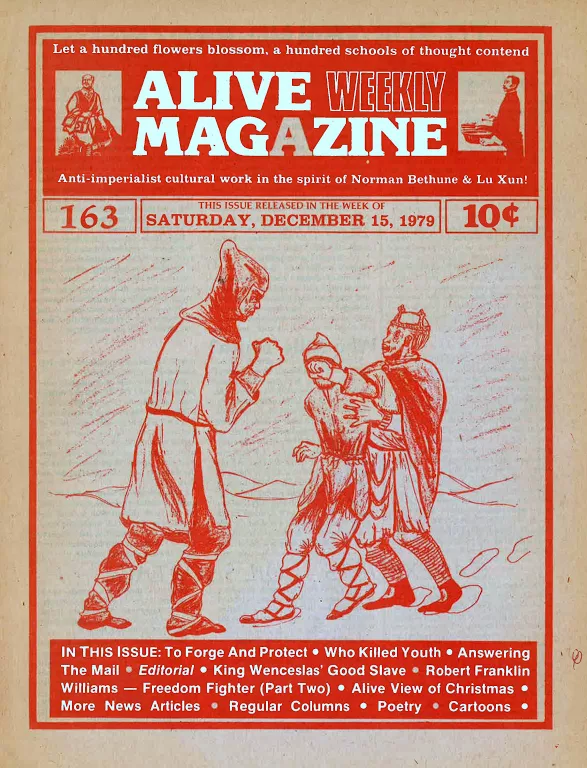
First Published: Alive Magazine No. 163, December 15, 1979
Transcription, Editing and Markup: Malcolm and Paul Saba
Copyright: This work is in the Public Domain under the Creative Commons Common Deed. You can freely copy, distribute and display this work; as well as make derivative and commercial works. Please credit the Encyclopedia of Anti-Revisionism On-Line as your source, include the url to this work, and note any of the transcribers, editors & proofreaders above.
GNS. December 10: In all corners of the world, revolutionaries are engaged in the struggle for unity. These struggles are not easy; nor are they simple processes. This year, landmarks of revolutionary unity in France, India, the United States, New Zealand and other countries have shown that unity amongst Leftists is not a pipe-dream. With a correct approach, based on Marxism-Leninism-Mao Zedong Thought, unity can be built in the interests of the people.
In France, the Marxist-Leninist Communist Party of France and the Revolutionary Communist Party (Marxist-Leninist) have brought their struggle for unity into its final stage. Beginning in January, the two groups will publish a single, daily revolutionary newspaper. Later in the year they will complete their merger and hold a congress of unification. In an October 24 press statement, the leaders of the two Parties stated: The unification of the two Parties shows that the Marxist-Leninist movement in France has passed its childhood; and that it knows how to settle its internal contradictions and has learnt step by step how to overcome certain “Leftist” faults committed in the early period of the movement.
An important development in the United States saw the unification of two major revolutionary groups, the Revolutionary Communist League (MLM) [RCL] and the League of Revolutionary Struggle (Marxist-Leninist) [LRS], in October. The LRS itself is the expression of the 1978 unity of two smaller groups, the August 29th Movement and I Wor Kuen (see Alive 126, p. 2). Since its founding the LRS has developed in a stepwise, progressive fashion, uniting many individuals and smaller groups in the course of expanding its revolutionary work. The League of Revolutionary Struggle (Marxist-Leninist) is the name of the unified organization.
The RCL had nearly 15 years of experience in the Afro-American people’s struggle for self-determination, for equal rights and against national oppression, noted the October 5-18 issue of Unity, newspaper of the LRS. “RCL has its roots in the Black liberation movement of the 1960’s when the Afro-American people rose up in a storm of struggle against their national oppression, shaking U.S. monopoly capitalism at its foundations. Many revolutionary fighters and organizations came forth during this period even though there was no genuine communist party to lead the masses.”
Upon uniting, the two organizations stated: “Our unity signals a big advance in the struggle for Marxist-Leninist unity and for a single, unified, vanguard communist party. It represents a strengthening of the communist forces and a blow against revisionism, trotskyism and opportunism.... In the course of our unity talks, the histories of both organizations have been affirmed, and we are determined to carry on the revolutionary tradition and Marxist-Leninist stand and attitude in the ranks of a single organization, the League of Revolutionary Struggle (M-L).”
The two largest revolutionary organizations in India also forged greater unity in 1979. Following a June meeting of the two groups, a joint communique stated: “Both organizations will develop joint activities with each other and all other communist revolutionary groups and cadres both at central and local levels on all people’s struggles and issue joint statements on various international and national matters, so as to build a strong anti-imperialist and anti-feudal revolutionary movement.”
In New Zealand, Marxist-Leninist organizations have shown their dedication to unite by holding fraternal discussions with one another. One of the groups, STRUGGLE, presented some highly relevant views on the question of unity in an issue of its journal:
“The unity we want is a unity of ideology above all. So it means inevitably a hard struggle between proletarian and bourgeois ideology. Unity certainly cannot be achieved without struggle.
“But what is meant is that the struggle must take place in a spirit of wanting unity.
“For instance, it would hardly help towards unity if the attitude shown is one of ’I’m completely correct and you should examine your stand, viewpoint, and method’. That is to say, it is the approach, the spirit of the approach, to the struggle of ideas. There must be an atmosphere of ease of mind in speaking one’s views without holding back; and there must be an atmosphere that one is prepared to have those views sharply disagreed with without flying into a rage. That’s part of the ideological remoulding we are all seeking. It’s not easy. It’s not achieved overnight. It’s a process.
“Indeed, achieving unity is a process too. It took us a long time to get to where we have in our views. We learned much that was new, discarded much that was old. It took a long time. But we were very patient with our own slowness!
“Why can’t we be patient with others who don’t agree with us? (Especially as they may be right and we quite wrong. Or both wrong and the truth something else that we could both come to out of our friendly struggle.)”
These positive developments in other countries provide useful models for progressive people in Canada. Where there is a correct approach, unity is entirely possible!